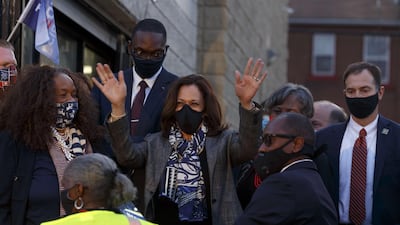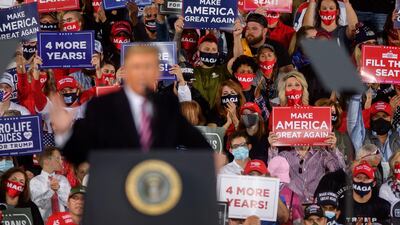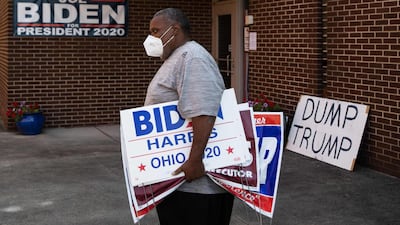For everyday American voters, the Middle East is barely a footnote in an election season dominated by talk of coronavirus, jobs, racial justice and whether a conservative Christian woman gets a seat on the country's highest court.
The view is different in reverse. From Rabat to Muscat, leaders scrutinise every poll to gauge whether President Donald Trump, a Republican, will beat his Democratic rival Joe Biden on November 3, and what that means for America's role in the region for the next four years.
The two men clash on how to handle Iranian assertiveness but may overlap on Israeli-Palestinian peace talks and Washington's ties to Gulf allies. It is unclear if the energy-independent US is disengaging from the oil-rich region, as some claimed.
"US policy on the Middle East can look similar under Republican and Democratic administrations, but Iran is the exception," Raed Jarrar, a Washington-based Arab-American analyst of US foreign policy, told The National.
"Still, I would expect Trump to dial back the rhetoric on Tehran in a potential second term, while a President Biden would take a softer policy, lift some sanctions and try to renegotiate the nuclear deal that the US pulled out of."
Mr Trump's signature Middle East policy has been the so-called "maximum pressure" campaign of reimposing US sanctions on Iran after abandoning the 2015 nuclear deal that Washington and other powers had brokered with Tehran during Barack Obama's presidency.
Mr Trump said it was the "worst deal ever", and only punishing US sanctions can force Iran back to the negotiating table and to limit its nuclear programme, missile-building and support for proxy forces such as the militant political group Hezbollah in Lebanon.
But Mr Trump "hit a cap" when a US drone strike killed Tehran's military mastermind Qassem Suleimani at Baghdad airport in January, Mr Jarrar said. Iran-backed militants retaliated, but neither Mr Trump nor Iran had the stomach for full-on war.
Mr Biden said he would work to repair ties with Europe that were strained by the Trump administration and would return to the 2015 deal if "Iran moves back into compliance" with uranium enrichment and other requirements.
For Alex Vatanka, who heads the Iran programme at the Middle East Institute, a Washington-based think tank, Mr Trump was willing to posture tough but not act on it. A multilateralist Biden administration would fare better.
"European support makes for a stronger American hand to knock on the Iranian door and talk nuclear issues," said Mr Vatanka. "The Iranians might be more willing to listen to the US together with its allies as opposed to when it's just Trump's swagger."
On Israel, Mr Trump has doubled down on his support, moving the US embassy from Tel Aviv to Jerusalem in 2018, recognising Israeli sovereignty over the disputed Golan Heights and proposing favourable terms in a peace deal with Palestinians.
Last month, Mr Trump signed the Abraham Accord between the UAE, Bahrain and Israel, normalising ties between the Gulf states and Israel in exchange for guarantees to not annex Palestinian land, while opening the door on trade, tourism and security co-operation.
For Jonathan Cristol, a Middle East research fellow at New York's Adelphi University, the accord was among Mr Trump's few successes and Mr Biden – if elected – would nudge other Arab countries towards their own normalisation pacts with Israel.
But, Mr Cristol said, the goal of successive American presidents to broker a final-status deal between Israelis and Palestinians would be likely to remain out of reach, whether it is Mr Biden or Mr Trump living in the White House at the end of January 2021.
"We're kidding ourselves if we think either man will make real progress," Mr Cristol said.
"Trump would continue to sideline and ignore the Palestinians; Biden would make a good-faith effort to bring the two sides together, but he is smart enough to know not to stake much credibility, energy, time, or effort, on either [Israeli Prime Minister Benjamin] Netanyahu or [Palestinian President Mahmoud] Abbas."
More broadly, Mr Trump questions the benefits of US military interventions in the Middle East, especially the 2003 Iraq invasion. He wants all troops serving in the longest US war yet, in Afghanistan, back "home by Christmas".
Analysts pointed to Mr Biden's more traditional view of America's leadership role in the world, and said that the isolationist Mr Trump sent more troops to the Middle East when tensions with Iran increased.
For Imad Harb, the director of research and analysis at the Arab Centre Washington DC, a think tank, Mr Trump's stated goal to exit the Middle East, which resonates with many on the left, may never translate into action.
"The potential for US disengagement from the Middle East is rather small, not because the US needs Middle Eastern oil but because US strategic considerations do not allow that," said Mr Harb.
"The US is a global power, and if Biden wins in the coming election – a very likely outcome – he will want to reassert that power everywhere. Still, the US is not going to act as any one state's protector in the region."
A survey this week from Pew Research Centre found that 54 per cent of US voters said Mr Biden made good foreign policy decisions, compared to 45 per cent for Mr Trump. Electorally, national polls put the Democrat about 10 percentage points ahead of Mr Trump.















